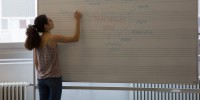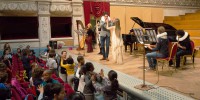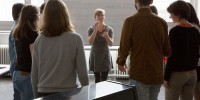Education
The Conservatoire royal de Bruxelles supports students in developing their own teaching skills, so that they can flourish as pedagogues.
From 2025-2026, the Pedagogy department will be organizing three initial teacher training courses in co-diploma with ULB:
- Master's in Teaching section 4 - Music, specializing in Musical Training (replaces the Master's in Didactics)
- Master's in Teaching section 5 - Music, specializing in Instruments (replaces the AESS/MD - Music)
- Master's in Teaching section 5 - Speech and Theatre Arts (replaces the AESS - Theatre)
The aim of the Master's in Teaching is to enable future teaching artists to master the disciplinary, pedagogical and didactic concepts and skills that will enable them to support their future students in developing their artistic skills.
Who is tomorrow's artist-teacher?
To prepare for tomorrow's teaching, future teachers in the Fédération Wallonie-Bruxelles are required to work on the following four families of skills (RFIE 2022 decree):
- the institutional, social and cultural actor;
- the actor of a learning organization in a collective dynamic;
- the organizer and accompanier of learning in an evolving dynamic ;
- the reflective practitioner.
The master's degree in teaching will build on the disciplinary training acquired during artistic training to train tomorrow's artist-teachers.
The specific features of CrB's pedagogical training:
- A primary focus on teaching in the ESAHR (music and theater academies) of the Wallonia-Brussels Federation;
-
A transversal common core at ULB (with teachers of all disciplines);
-
Interdisciplinary reflection on art and teaching (between music and theater);
-
A strong emphasis on the didactics of the artistic discipline;
-
A gradual, professional introduction to the realities of teaching (discovery internship, initiation internship and integration internship);
-
A personalized seminar program;
-
A research dynamic in arts education;
-
Support geared to the progress of each student;
-
A collective, festive performance of the Socrates Oath.
In-depth mastery of the French language by future artist-teachers
As future artist-teachers are expected to have an in-depth mastery of the written and spoken French language in order to teach and communicate adequately:
-a compulsory preliminary test to verify in-depth mastery of the French language is organized in the first four months of the course. In the event of failure, a 5 ECTS French language course will be added to the student's program of study: (General information on the test - Site mes études)
2 skills assessed:
-
- analyze and summarize an informative or argumentative written text in terms of explicit and implicit content ;
-
- produce a written argumentative text, using an appropriate writing process, including syntax and spelling rules.
In-depth mastery of the French language as sender and receiver in a professional context is also assessed through the various productions in the program.
The life of the department I Calendar 2025-2026


